7B Uit2 Neighbours Grammar课件
文档属性
| 名称 | 7B Uit2 Neighbours Grammar课件 | 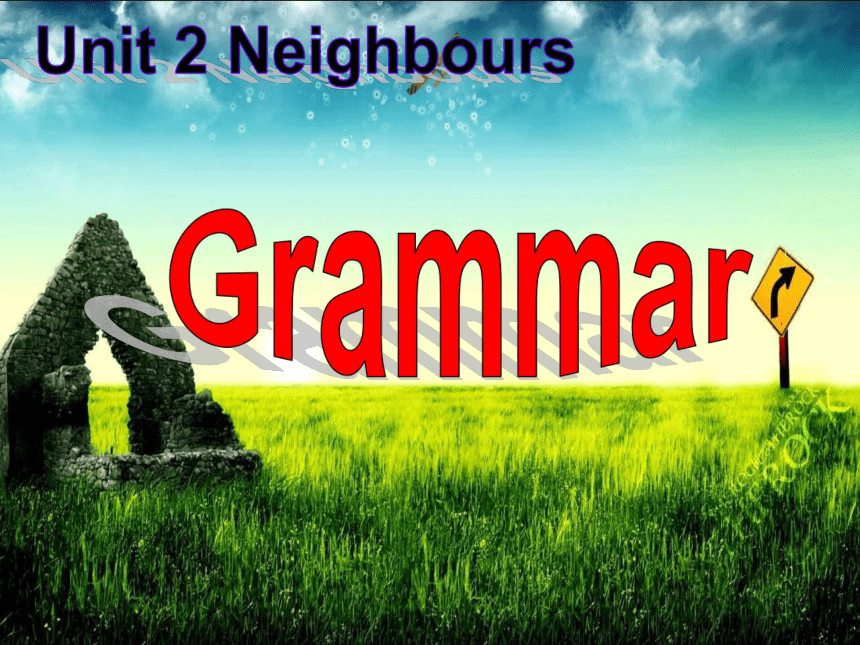 | |
| 格式 | zip | ||
| 文件大小 | 1.0MB | ||
| 资源类型 | 教案 | ||
| 版本资源 | 牛津译林版 | ||
| 科目 | 英语 | ||
| 更新时间 | 2016-04-08 21:23:55 | ||
图片预览


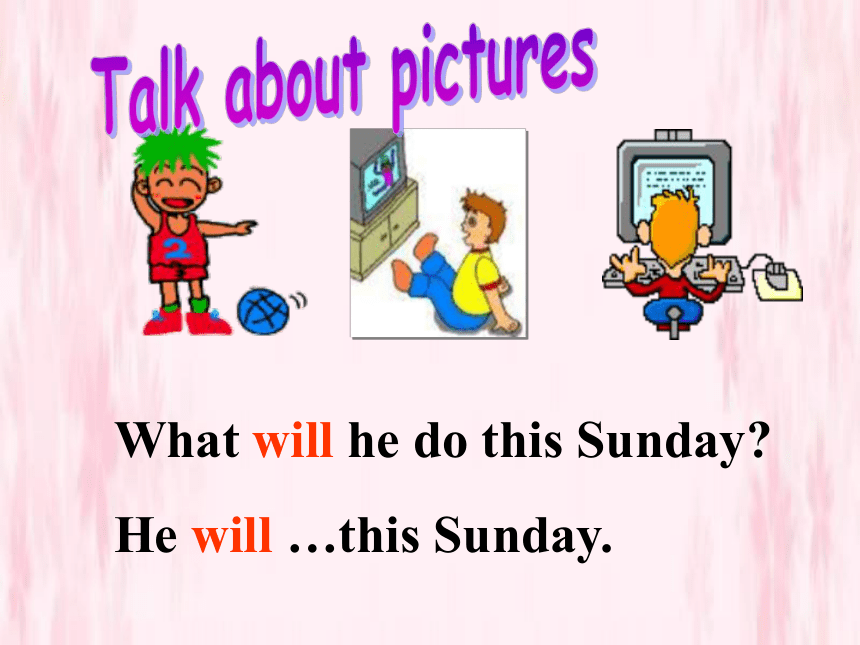


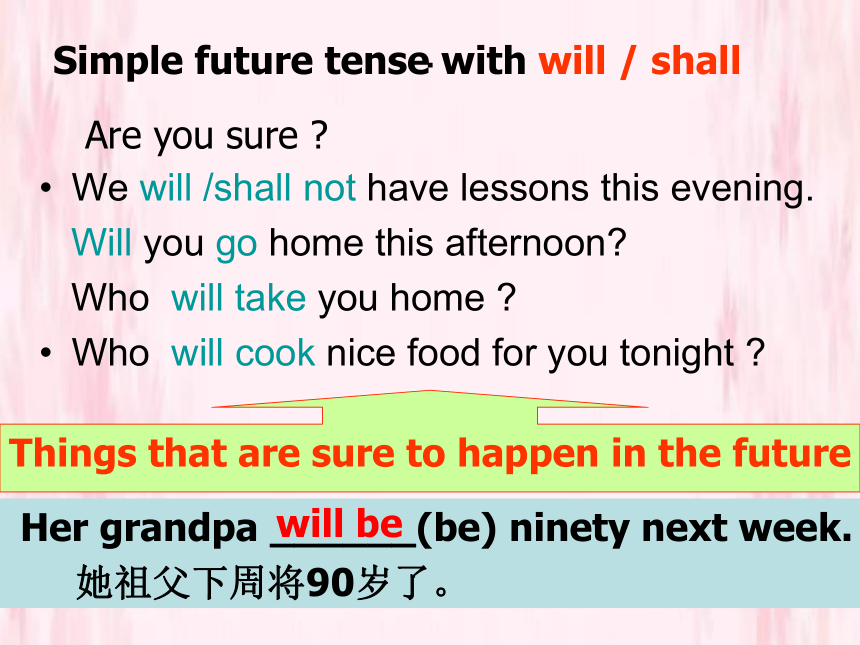
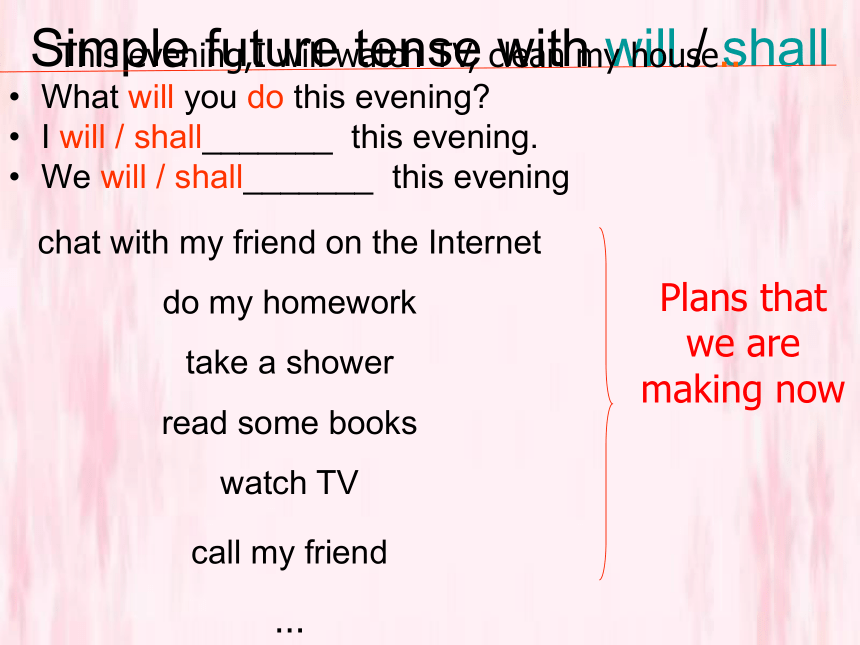
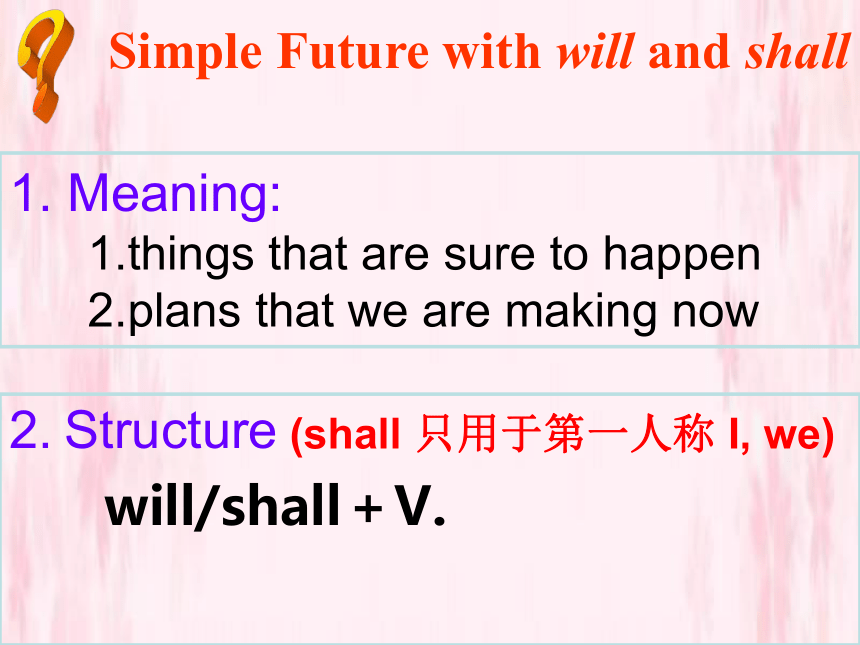
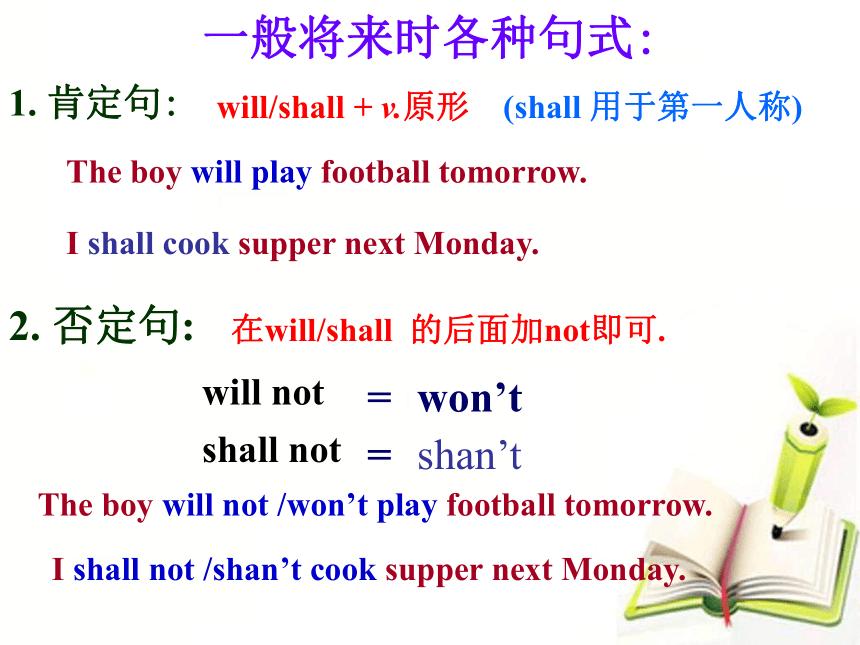

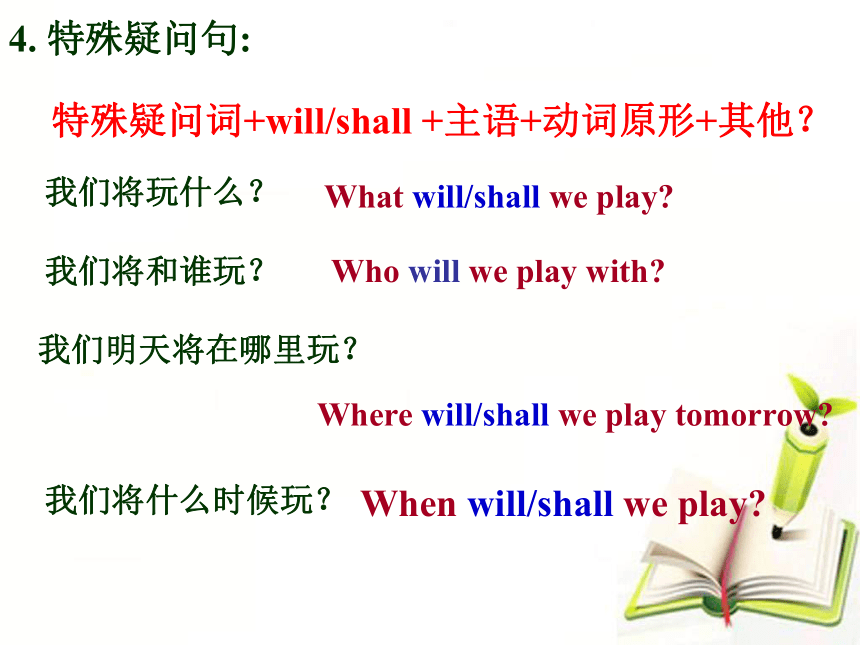
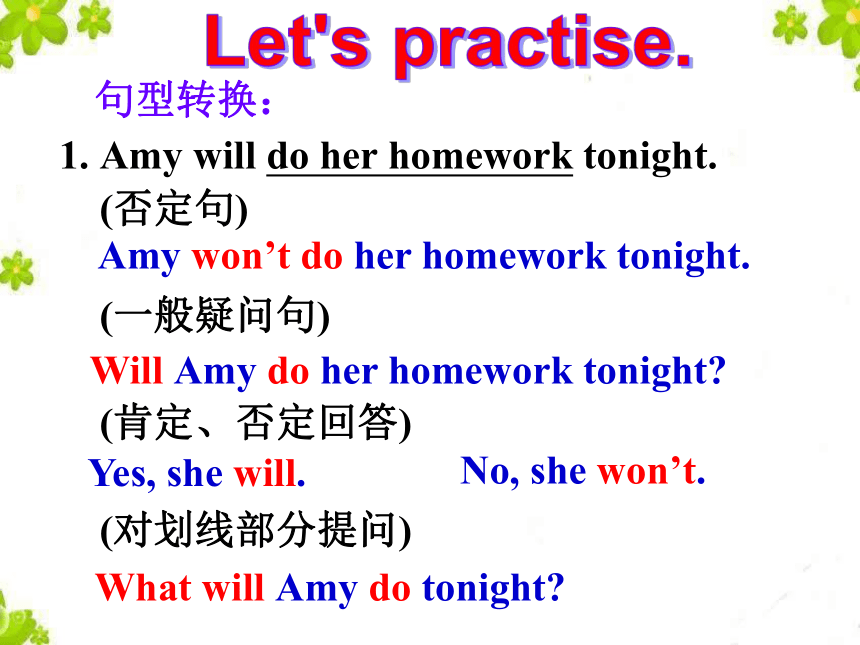
文档简介
课件44张PPT。GrammarUnit 2 NeighboursWhat are they doing?
What will they do?Look at these pictures
and answer the questions.What will he do this Sunday?
He will …this Sunday.Talk about picturesWill you visit … this summer?
Yes , I will / No, I won’tWe use simple future tense to talk about things that ____ _______.willhappen一般将来时的含义:表示将要发生的事情。一般将来时A. Simple future tense with will and shall . We will /shall not have lessons this evening.
Will you go home this afternoon?
Who will take you home ?
Who will cook nice food for you tonight ?Are you sure ?Simple future tense with will / shall Her grandpa ______(be) ninety next week.
她祖父下周将90岁了。will beWhat will you do this evening?
I will / shall_______ this evening.
We will / shall_______ this evening
chat with my friend on the Internet
do my homework
take a shower
read some books
watch TV
call my friend
…Plans that we are making nowSimple future tense with will / shallThis evening,I will watch TV, clean my house..1. Meaning: 1.things that are sure to happen 2.plans that we are making now2. Structure (shall 只用于第一人称 I, we)
will/shall+V.Simple Future with will and shall?一般将来时各种句式:1. 肯定句:will/shall + v.原形 (shall 用于第一人称)The boy will play football tomorrow.I shall cook supper next Monday.2. 否定句:will not shan’tThe boy will not /won’t play football tomorrow.在will/shall 的后面加not即可.=won’t shall not =I shall not /shan’t cook supper next Monday.3. 一般疑问句:将will/shall置于句首,Will the boy play football tomorrow?Shall I cook supper next Monday?结尾变问号 一般疑问句回答:肯定: Yes, 人称代词 + will/shall.否定: No, 人称代词 + won’t/shan’t.Yes, I shall.Yes, he will.No, I shan’t.No, he won’t.4. 特殊疑问句:What will/shall we play?Who will we play with?我们将玩什么?我们将和谁玩?我们明天将在哪里玩?Where will/shall we play tomorrow? 我们将什么时候玩?When will/shall we play? 特殊疑问词+will/shall +主语+动词原形+其他?1. Amy will do her homework tonight.
(否定句)
(一般疑问句)
(肯定、否定回答)
(对划线部分提问) Amy won’t do her homework tonight.Let's practise.Will Amy do her homework tonight?Yes, she will.No, she won’t.What will Amy do tonight?句型转换:2. I shall eat noodles this evening.
(1)
(2)
3. My mother will carry all the food.
(1)
(2)What shall I eat this evening?When shall I eat noodles?What will your mother carry?Who will carry all the food?1. tomorrow/ tomorrow morning/afternoon…
2. the day after tomorrow 后天
3. next Tuesday/ /week/year/month/Sunday..
4. the coming/following Sunday /weekend/Tuesday
即将到来的…
5. this evening /this afternoon/ tonight(今晚)
6. in + 一段时间 …之后
in an hour /in five days/in two years 8. soon不久将来时的典型标志:7. in + 将来的年代in 2016in the future(在将来) 9. 祈使句, + 句子 (可用将来时/进行时)Hurry up , or we ________(be) late.will be用正确的时态填空:
1. The twin brothers _______ (go) fishing next Tuesday.
2. We _____________ (meet) outside the school gate tomorrow.
3. How ____ they ____ (visit) the Museum this Sunday?
4. We _________________(leave) school in 2016.will gowill/shall meetwill visitwill/shall leave5. There __________(be) a match on TV tonight.will be6. Don’t worry . She _________ (lend) some money.will lend7. She ___________ (come) to see me in a week.will come8. We __________(go) to the Summer Palace soon. will/shall go9. ________ we ____(have) a trip the coming Sunday? Will/Shallhave Simon’s computer is broken. He is asking
someone at the community centre for help.
Complete their conversation with the simple
future tense of the verbs in brackets.Asking for help Mr Lin: Hello, Simon. Do you need any help?
Simon: Yes, Mr Lin. There’s something wrong with my computer.
Mr Lin: OK. We (1) ____________ (ask) an engineer to check it for you.
Simon: When (2) ___ the engineer ___ (be) free?
Mr Lin: Well, we (3) _________ (call) him first. (4) ____ you ____ (wait) for us to call back?
Simon: All right. I (5) ____________ (wait) for your call. Thanks.
Mr Lin: You are welcome.
will / shall askwillbewill callWillwaitwill / shall waitWhen can we use
“be going to” structure? What is he going to do
next Monday?He is going to talk on TV.What are they going to do tomorrow?They are going to play football.What are they going to do next week?They are going to have a picnic.What is the baby going to do next week?He is going to have a birthday party.What is he going to do tomorrow evening ?He is going to do some washing.Hongshan ZooSee the doctorAre you going to … ?
Yes , I am. / No, I am notWe use ‘be going to’ to talk about fixed plans for a certain time in the near future.be going to 结构的含义: 表示计划、打算或在不远的将来要做某事。B. Simple future tense with be going toIt is so cloudy.
It ____________rain.is going toThings that will probably happen.Simple future tense with be going to表示将可能发生的事。something we decide to do
e.g. I am going to visit our new neighbours.
She is going to watch the film next Friday.
2. things that will probably happen
e.g. It is nine o’clock. We are going to be late.
It is so cloudy. I think it is going to rain.We can use “be going to” structure when we talk about:1.肯定句:
主语 + am/is/are going to +动词原形…
2.否定句:
主语 +am/is/are not going to +动词原形…
3.一般疑问句:
Am/Is/Are +主语 +going to + 动词原形…? ‘be going to’各种句式be going to do = will/shall do4. 特殊疑问句:(1) 疑问词 + am/is/are + 主语 + going to + v.原形Where is he going?他打算去哪里?Who is going to play football?你打算去哪里踢足球?(2) 疑问词 + is + going to + v.原形 + 其他你打算什么时候去踢足球?谁打算去踢足球?When are you going to play football?Where are you going to play football?Simon is telling Amy about his plan for a day out with his uncle’s family. Help him use the correct forms of be going to to talk about his plan.Planning a day outSimon: Hi, Amy. My parents and I are planning a day out with my uncle’s family the day after tomorrow.
Amy: Great! What (1)___ you _________ (do)?
Simon: I (2) ______________ (buy) some food, and my cousin Annie (3) _____________ (buy) some plates and forks.
Amy: What (4) ___ your parents __________ (do)?
Simon: They (5) ________________ (bring) some water.
Amy: How about your uncle?
Simon: He (6) ______________ (make) a fire.
Amy: And your aunt? What (7) ____ she _________ (do)?
Simon: She (8) ______________ (cook) some food.aregoing to doam going to buyis going to buyaregoing to doare going to bringis going to makeisgoing to dois going to cook一般将来时两种基本句式的区别
1.will与shall+v
1)表示一个将来的动作或状态,“要…,会…”
She will go to the park tomorrow.
2)表示不以人的意志为转移的自然发展的事。
Tom will be 18 next year.
Spring will come again.
Tomorrow will be Sunday.
3) will+v 有时表示说话是临时决定或打算。
--- My car won’t start.
---Don’t worry, I will come and give it a
push.
2、be going to
①表示计划,安排要做的事
②表示现在的迹象推断未来可能发生某事。
--- What ________________do this evening?
--- I_____________do my lessons.
看那些乌云要下雨了.
Loot at the dark clouds. It __________rain.
is going toare you going toam going toExercises:
Look at the clouds. It _______________(rain).
My mother ___________(be) 40 years old next year.
Tomorrow ______________(be) Saturday.
If you walk across the road, you ________(see) the mall.
Paul __________(leave) Nanjing next month.
Where ____ you ______ (go) next week?
When ____ you ____ (want) to do this weekend.
We __________(plan) the trip next weekend now.is going to rainwill bewill be/ iswill seeis leavingaregoingdowantare planningPay attention to these! 有些动词,如:come, go, leave start, arrive, fly, take off(起飞)等,其现在进行时可表示将来时。eg. (1) We are leaving on Sunday.(2) Lisa is coming back from New York tomorrow.(3) Is your father going to the USA soon?Pay attention to these!** There be的将来时:There will be …
(2)There is/are going to be …
____ __ _____ ___ ___ a party at
the school hall tomorrow afternoon.在操场上明天将进行一场比赛。明天下午计划在学校礼堂进行一个聚会。ThereisgoingtobeThere will have…
There be going to have…There ____ ____ a match on the playground tomorrow.will be1. take an umbrella with
2. be free
3. call him first
4. wait for us to call back
5. wait for your call
6. It’s so cloudy. I think it’s going to rain.
7. have a party
8. plan a day out
9. the day after tomorrow
10. some plates and forks
11. bring some water
12. make a fire
随身带把伞有空先打电话给他等你的电话举行聚会Useful phrases天上很多云,我认为要下雨了.生火等待我们回电计划外出一天后天一些盘子和叉子带来一些水We _______________ (meet) outside the school gate tomorrow.
2. How ____ they ___________ (visit) the History Museum next week?
3. Look! The sun _________ (shine) in through the window.
4. He _________ (sit) on the balcony and _______ (look) out at the park at present.Exercisesshall/will meetare going to meetwillvisitaregoing to visitis shiningis sittinglooking5. We are going to have an exam next week.(改为否定句并提问)
6. Tom will see a film this evening.
(提问)
We aren’t going to have an exam next week. What are you going to have next week?What will Tom see this evening?7. Madee is studying Chinese now.
(用 next year 改写)
8. 两天后学校里将有一场排球比赛。Madee will/is going to study Chinese next year.There will/is going to be a volleyball match at school in two days.1. 一直往前走,你会发现你的左边有一个饭店。
2. 我明天到上海。 (否定句,一般疑问句,肯定/否定回答)
3. 明天我将去公园。(否定句,一般疑问句,肯定/否定回答)Homework翻译下面句子并根据要求转换句型。4. 今天晚上我去购物。 (否定句,一般疑问句,肯定/否定回答)
5. 下个月他就16岁。 (否定句,一般疑问句,肯定/否定回答)
6. 明天有雨。 (否定句,一般疑问句,肯定/否定回答)7. 我打算买一辆小汽车。 (否定句,一般疑问句,肯定/否定回答)
8. 这个星期天你去游泳吗?
9. 你长大以后打算干什么?
What will they do?Look at these pictures
and answer the questions.What will he do this Sunday?
He will …this Sunday.Talk about picturesWill you visit … this summer?
Yes , I will / No, I won’tWe use simple future tense to talk about things that ____ _______.willhappen一般将来时的含义:表示将要发生的事情。一般将来时A. Simple future tense with will and shall . We will /shall not have lessons this evening.
Will you go home this afternoon?
Who will take you home ?
Who will cook nice food for you tonight ?Are you sure ?Simple future tense with will / shall Her grandpa ______(be) ninety next week.
她祖父下周将90岁了。will beWhat will you do this evening?
I will / shall_______ this evening.
We will / shall_______ this evening
chat with my friend on the Internet
do my homework
take a shower
read some books
watch TV
call my friend
…Plans that we are making nowSimple future tense with will / shallThis evening,I will watch TV, clean my house..1. Meaning: 1.things that are sure to happen 2.plans that we are making now2. Structure (shall 只用于第一人称 I, we)
will/shall+V.Simple Future with will and shall?一般将来时各种句式:1. 肯定句:will/shall + v.原形 (shall 用于第一人称)The boy will play football tomorrow.I shall cook supper next Monday.2. 否定句:will not shan’tThe boy will not /won’t play football tomorrow.在will/shall 的后面加not即可.=won’t shall not =I shall not /shan’t cook supper next Monday.3. 一般疑问句:将will/shall置于句首,Will the boy play football tomorrow?Shall I cook supper next Monday?结尾变问号 一般疑问句回答:肯定: Yes, 人称代词 + will/shall.否定: No, 人称代词 + won’t/shan’t.Yes, I shall.Yes, he will.No, I shan’t.No, he won’t.4. 特殊疑问句:What will/shall we play?Who will we play with?我们将玩什么?我们将和谁玩?我们明天将在哪里玩?Where will/shall we play tomorrow? 我们将什么时候玩?When will/shall we play? 特殊疑问词+will/shall +主语+动词原形+其他?1. Amy will do her homework tonight.
(否定句)
(一般疑问句)
(肯定、否定回答)
(对划线部分提问) Amy won’t do her homework tonight.Let's practise.Will Amy do her homework tonight?Yes, she will.No, she won’t.What will Amy do tonight?句型转换:2. I shall eat noodles this evening.
(1)
(2)
3. My mother will carry all the food.
(1)
(2)What shall I eat this evening?When shall I eat noodles?What will your mother carry?Who will carry all the food?1. tomorrow/ tomorrow morning/afternoon…
2. the day after tomorrow 后天
3. next Tuesday/ /week/year/month/Sunday..
4. the coming/following Sunday /weekend/Tuesday
即将到来的…
5. this evening /this afternoon/ tonight(今晚)
6. in + 一段时间 …之后
in an hour /in five days/in two years 8. soon不久将来时的典型标志:7. in + 将来的年代in 2016in the future(在将来) 9. 祈使句, + 句子 (可用将来时/进行时)Hurry up , or we ________(be) late.will be用正确的时态填空:
1. The twin brothers _______ (go) fishing next Tuesday.
2. We _____________ (meet) outside the school gate tomorrow.
3. How ____ they ____ (visit) the Museum this Sunday?
4. We _________________(leave) school in 2016.will gowill/shall meetwill visitwill/shall leave5. There __________(be) a match on TV tonight.will be6. Don’t worry . She _________ (lend) some money.will lend7. She ___________ (come) to see me in a week.will come8. We __________(go) to the Summer Palace soon. will/shall go9. ________ we ____(have) a trip the coming Sunday? Will/Shallhave Simon’s computer is broken. He is asking
someone at the community centre for help.
Complete their conversation with the simple
future tense of the verbs in brackets.Asking for help Mr Lin: Hello, Simon. Do you need any help?
Simon: Yes, Mr Lin. There’s something wrong with my computer.
Mr Lin: OK. We (1) ____________ (ask) an engineer to check it for you.
Simon: When (2) ___ the engineer ___ (be) free?
Mr Lin: Well, we (3) _________ (call) him first. (4) ____ you ____ (wait) for us to call back?
Simon: All right. I (5) ____________ (wait) for your call. Thanks.
Mr Lin: You are welcome.
will / shall askwillbewill callWillwaitwill / shall waitWhen can we use
“be going to” structure? What is he going to do
next Monday?He is going to talk on TV.What are they going to do tomorrow?They are going to play football.What are they going to do next week?They are going to have a picnic.What is the baby going to do next week?He is going to have a birthday party.What is he going to do tomorrow evening ?He is going to do some washing.Hongshan ZooSee the doctorAre you going to … ?
Yes , I am. / No, I am notWe use ‘be going to’ to talk about fixed plans for a certain time in the near future.be going to 结构的含义: 表示计划、打算或在不远的将来要做某事。B. Simple future tense with be going toIt is so cloudy.
It ____________rain.is going toThings that will probably happen.Simple future tense with be going to表示将可能发生的事。something we decide to do
e.g. I am going to visit our new neighbours.
She is going to watch the film next Friday.
2. things that will probably happen
e.g. It is nine o’clock. We are going to be late.
It is so cloudy. I think it is going to rain.We can use “be going to” structure when we talk about:1.肯定句:
主语 + am/is/are going to +动词原形…
2.否定句:
主语 +am/is/are not going to +动词原形…
3.一般疑问句:
Am/Is/Are +主语 +going to + 动词原形…? ‘be going to’各种句式be going to do = will/shall do4. 特殊疑问句:(1) 疑问词 + am/is/are + 主语 + going to + v.原形Where is he going?他打算去哪里?Who is going to play football?你打算去哪里踢足球?(2) 疑问词 + is + going to + v.原形 + 其他你打算什么时候去踢足球?谁打算去踢足球?When are you going to play football?Where are you going to play football?Simon is telling Amy about his plan for a day out with his uncle’s family. Help him use the correct forms of be going to to talk about his plan.Planning a day outSimon: Hi, Amy. My parents and I are planning a day out with my uncle’s family the day after tomorrow.
Amy: Great! What (1)___ you _________ (do)?
Simon: I (2) ______________ (buy) some food, and my cousin Annie (3) _____________ (buy) some plates and forks.
Amy: What (4) ___ your parents __________ (do)?
Simon: They (5) ________________ (bring) some water.
Amy: How about your uncle?
Simon: He (6) ______________ (make) a fire.
Amy: And your aunt? What (7) ____ she _________ (do)?
Simon: She (8) ______________ (cook) some food.aregoing to doam going to buyis going to buyaregoing to doare going to bringis going to makeisgoing to dois going to cook一般将来时两种基本句式的区别
1.will与shall+v
1)表示一个将来的动作或状态,“要…,会…”
She will go to the park tomorrow.
2)表示不以人的意志为转移的自然发展的事。
Tom will be 18 next year.
Spring will come again.
Tomorrow will be Sunday.
3) will+v 有时表示说话是临时决定或打算。
--- My car won’t start.
---Don’t worry, I will come and give it a
push.
2、be going to
①表示计划,安排要做的事
②表示现在的迹象推断未来可能发生某事。
--- What ________________do this evening?
--- I_____________do my lessons.
看那些乌云要下雨了.
Loot at the dark clouds. It __________rain.
is going toare you going toam going toExercises:
Look at the clouds. It _______________(rain).
My mother ___________(be) 40 years old next year.
Tomorrow ______________(be) Saturday.
If you walk across the road, you ________(see) the mall.
Paul __________(leave) Nanjing next month.
Where ____ you ______ (go) next week?
When ____ you ____ (want) to do this weekend.
We __________(plan) the trip next weekend now.is going to rainwill bewill be/ iswill seeis leavingaregoingdowantare planningPay attention to these! 有些动词,如:come, go, leave start, arrive, fly, take off(起飞)等,其现在进行时可表示将来时。eg. (1) We are leaving on Sunday.(2) Lisa is coming back from New York tomorrow.(3) Is your father going to the USA soon?Pay attention to these!** There be的将来时:There will be …
(2)There is/are going to be …
____ __ _____ ___ ___ a party at
the school hall tomorrow afternoon.在操场上明天将进行一场比赛。明天下午计划在学校礼堂进行一个聚会。ThereisgoingtobeThere will have…
There be going to have…There ____ ____ a match on the playground tomorrow.will be1. take an umbrella with
2. be free
3. call him first
4. wait for us to call back
5. wait for your call
6. It’s so cloudy. I think it’s going to rain.
7. have a party
8. plan a day out
9. the day after tomorrow
10. some plates and forks
11. bring some water
12. make a fire
随身带把伞有空先打电话给他等你的电话举行聚会Useful phrases天上很多云,我认为要下雨了.生火等待我们回电计划外出一天后天一些盘子和叉子带来一些水We _______________ (meet) outside the school gate tomorrow.
2. How ____ they ___________ (visit) the History Museum next week?
3. Look! The sun _________ (shine) in through the window.
4. He _________ (sit) on the balcony and _______ (look) out at the park at present.Exercisesshall/will meetare going to meetwillvisitaregoing to visitis shiningis sittinglooking5. We are going to have an exam next week.(改为否定句并提问)
6. Tom will see a film this evening.
(提问)
We aren’t going to have an exam next week. What are you going to have next week?What will Tom see this evening?7. Madee is studying Chinese now.
(用 next year 改写)
8. 两天后学校里将有一场排球比赛。Madee will/is going to study Chinese next year.There will/is going to be a volleyball match at school in two days.1. 一直往前走,你会发现你的左边有一个饭店。
2. 我明天到上海。 (否定句,一般疑问句,肯定/否定回答)
3. 明天我将去公园。(否定句,一般疑问句,肯定/否定回答)Homework翻译下面句子并根据要求转换句型。4. 今天晚上我去购物。 (否定句,一般疑问句,肯定/否定回答)
5. 下个月他就16岁。 (否定句,一般疑问句,肯定/否定回答)
6. 明天有雨。 (否定句,一般疑问句,肯定/否定回答)7. 我打算买一辆小汽车。 (否定句,一般疑问句,肯定/否定回答)
8. 这个星期天你去游泳吗?
9. 你长大以后打算干什么?
